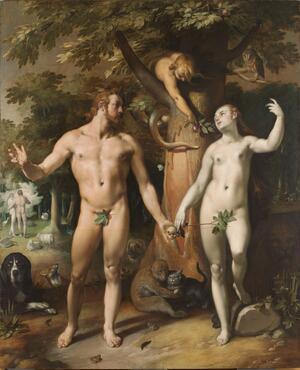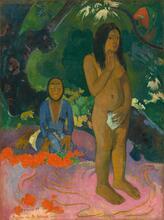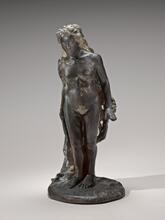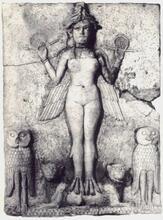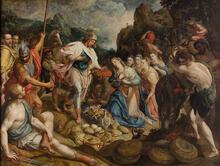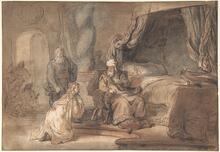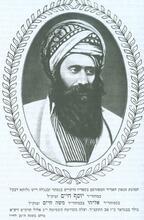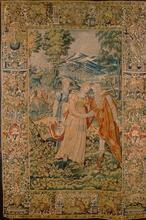Eve: Apocrypha
Eve, the first woman according to the Eden story, is mentioned very rarely in the Apocryphal/Deuterocanonical Books. One text mentions her by name and four others allude to her. Only Sirach (also known as Ecclesiasticus or Ben Sira) presents the negative theological judgment that women are the source of sin, and if this passage refers to Eve it is the earliest attribution of the origin of sin to Eve. Later developments of this idea can be found in several pseudepigraphical works. Multiple allusions to Eve in various passages continue the longstanding debate of the origin of sin.
Mentions in the Book of Tobit
Eve, the first woman according to the Eden story (Genesis 2–3), is mentioned very rarely in the Apocryphal/Deuterocanonical Books. One text mentions her by name (Tob 8:6), and four others allude to her (Sir 25:24; 40:1; 42:13; 4 Macc 18:7). Only Sirach (also known as Ecclesiasticus or Ben Sira) presents the negative theological judgment that women are the source of sin.
The Book of Tobit tells the story of two families who have experienced various misfortunes. Through the marriage of Tobias, son of a father who has been blinded, and Sarah, whose first seven husbands have died on the wedding night, the two families come together and are blessed. Before Tobias and Sarah consummate their marriage, they pray (in Tob 8:5a, both pray; in Tob 8:5b, only Tobias speaks). This prayer contains one of only two named references to both Eve and Adam outside Genesis in the Hebrew Bible (the other mention of both occurs in 1 Tim 2:13). Echoing and quoting Gen 2:18, Tobias says, “You made Adam, and for him you made his wife Eve/as a helper and support./From the two of them the human race has sprung./You said, ‘It is not good that the man should be alone;/let us make a helper for him like himself.’ I now am taking this kinswoman of mine,/not because of lust, but with sincerity./Grant that she and I may find mercy/and that we may grow old together” (Tob 8:6–7). When the prayer is finished, they both say, “Amen, Amen” (Tob 8:8). As in Genesis, the word helper likely signals mutuality. Tobias’s addition of the word support further indicates his understanding of gender relations, as does his statement that he takes this woman. Man (not a generic human being) was created first in this interpretation, and the family is unquestionably patriarchal.
Origin of Sin
The other possible references to Eve in the Apocryphal/Deuterocanonical Books do not refer to her by name. The most well known is in the Book of Sirach, which reads: “From a woman sin had its beginning,/and because of her we all die” (Sir 25:24). The context of this verse is a longer passage about good and evil wives (Sir 25:13–26:18). It reviles a wicked wife and reveals a very negative view of women. If Sir 25:24 is understood as a reference to Eve, it is related to the material that precedes and follows as a generalized association of evil with women and the legitimization of harsh treatment of a disobedient wife.
Although Sirach does not name Eve, interpreters have often held that the author is referring to the Garden of Eden story (Genesis 2–3). If this view is correct, then Sir 25:24 is the earliest attribution of the origin of sin to Eve. Later developments of this idea can be found in several pseudepigraphical works (noncanonical Jewish documents that were influential in popular religious circles, especially Christian ones): the Books of Adam and Eve (chaps. 3, 5 16, 18), the Apocalypse of Moses (24:1–2), 2 Enoch (30:16–18; 31:6), and Targum Pseudo-Jonathan.
Attribution of the origin of sin to Eve was not typical of Jewish interpretation at the time Sirach was written (second century b.c.e.). The common view was that sin had its beginning in the cohabitation of evil angels with human women described in Gen 6:1–4 (see the pseudepigraphical books of 1 Enoch 6:1–6; 7:1–6; 15:2–16; Jubilees 5:1–6; 10:1, 5–9, 11; the Cairo Damascus Document 11:16–18). Later, the rabbis usually traced the origin of sin and death to Adam rather than to Eve. If Ben Sira is referring to Eve in Sir 25:24, then he held an uncommon view for his time.
It is possible that Sir 25:24 does not refer to Eve, but to the evil wife who is the subject of the passage. She (and collectively all bad wives) causes her husband to sin and thus brings death to her unfortunate husband, who may have been understood as all (or almost all) men. This view is more consistent with Ben Sira’s remarks on this subject found elsewhere in Sirach, with the immediate context in Sirach 25, and with the common view of the time. It is also possible that Ben Sira intended the reader to understand the primary reference as evil wives, but nevertheless was making a veiled allusion to the Genesis story of the garden.
Other Potential References to Eve
Sir 40:1 includes another phrase that sounds like a reference to Eve: “Hard work was created for everyone,/and a heavy yoke is laid on the children of Adam,/from the day they come forth from their mother’s womb/until the day they return to the mother of all the living.” In Gen 3:20, Eve is called the “mother of all living” because the Hebrew word hawwa is related to the Hebrew word for “life.” In Sirach, however, it is clear that the womb from which new life emerges and to which all return is Mother Earth. As in Job 1:21, earth is both womb and tomb. The phrase “the living” in Sir 40:1 may be an addition, since it appears in the Hebrew but not the Greek. If these words are removed, then this is likely not an allusion to Eve.
A clear, though indirect, allusion to Eve is found in 4 Macc 18:7. In this verse a righteous woman says, “I was a pure virgin and did not go outside my father’s house; but I guarded the rib from which woman was made.” The reference is to Gen 2:22. The following verse offers further clarification when the woman declares “no seducer corrupted me on a desert plain, nor did the destroyer, the deceitful serpent, defile the purity of my virginity” (4 Macc 18:8). Her words embody the ancient Jewish belief that women were in danger of seduction by evil spirits (Genesis 6; Jubilees 4, 5; Enoch 6; Testament of Reuben 5:6) who were thought to inhabit deserts. The descendants of the first union of human women and spirits (Genesis 6), the giants known as Nephilim, became demons who corrupt humanity (Jubilees 7:27) and seduce women (Enoch 15). The reference to “the destroyer, the deceitful serpent” suggests the serpent of the Garden of Eden, whose allure is here understood to have been sexual.
Collins, John J. Jewish Wisdom in the Hellenistic Age. Louisville: 1997.
Freedman, R. David. “Woman, a Power Equal to Man: Translation of Woman as a ‘Fit Helpmate’ for Man Is Questioned.” Biblical Archaeology Review 9 (1983): 56–58.
Kvam, Kristen E., Linda S. Schearing, and Valarie H. Ziegler, eds. Eve and Adam: Jewish, Christian, and Muslim Readings on Genesis and Gender. Bloomington, Indiana: 1999.
Levison, Jack. “Is Eve to Blame? A Contextual Analysis of Sirach 25:24.” Catholic Biblical Quarterly 47 (1985): 617–623.
Meyers, Carol, General Editor. Women in Scripture. New York: 2000.
Phillips, John A. Eve: The History of an Idea. San Francisco: 1984.
Trenchard, Warren C. Ben Sira’s View of Women: A Literary Analysis. Chico, California: 1982.

